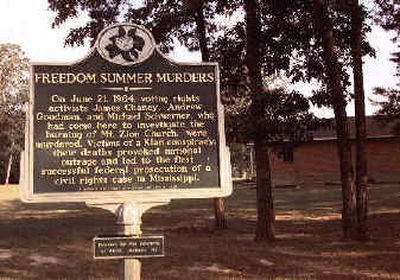Group honors slain activists

PHILADELPHIA, Miss. — The last thing Jewel McDonald’s parents saw, that night in 1964 when her mother was nearly beaten to death, were white Ku Klux Klan robes fluttering through the dark like doves’ wings as Klansmen ran toward her church.
As they beat members of the tiny black congregation in rural Mississippi, the Klansmen ranted that the attack was punishment for participating in a voter-registration drive organized by three civil rights activists.
One of the congregants prayed aloud for God to spare their lives.
“Something in her voice made the Klan so superstitious they stopped the beating,” McDonald, 57, said recently as she brushed tears from her eyes.
But soon afterward, the church burned to the ground. When the three young activists — James Chaney, Michael Schwerner and Andrew Goodman — tried to investigate, they were abducted on a rural road and murdered. No one was ever tried for the killings.
Four decades later, McDonald and her neighbors have formed a multiracial coalition to memorialize the trio, and have renewed calls for an investigation. The group invited the men’s families to attend a memorial service today at the rebuilt Mt. Zion United Methodist Church.
Chaney, a 21-year-old black man from Mississippi, Schwerner, 24, and Goodman, 20 — both white men from New York City — were part of the 1964 “Freedom Summer” program in which young civil rights workers organized voter education and registration campaigns.
Their actions still resonate in this rural area northeast of Jackson, where residents remember the fear of going against the Klan.
Blacks had to pass a written test to vote, so the activists taught locals how to read.
Mt. Zion member Cornelius Steele said when he tried to register, a smirking clerk handed him a test that asked: “How many bubbles are in a bar of soap?”
Seven Klansmen were convicted of federal civil rights violations in the June 21, 1964, deaths, which became the subject of the 1988 movie “Mississippi Burning.”
They received sentences of three to 10 years. The state never brought murder charges, and none of those convicted served more than six years. All are now dead.
Along with the Mississippi attorney general, coalition members have urged federal investigators to help find those who aided the killers. Federal authorities are still reviewing the matter.
Steve Wilkerson was 12 during Freedom Summer. He recalled that his father was determined to shield him from the hatred brewing as Klan violence escalated.
“He said: ‘You can ride your bike and go to Little League, otherwise you’ll spend your time playing in the garden,’ ” said Wilkerson, who is white.
When the activists vanished, “I remember whites said they might be hiding for a publicity stunt,” Wilkerson said. “They desperately wanted to believe. But when weeks passed, it was clear something terrible had happened.”
McDonald said federal agents searched black homes daily because some insisted the activists were hiding.
One agent gave McDonald a dime and phone numbers of the few FBI agents he trusted. “He told me to call one of them in an emergency and we didn’t have a phone,” McDonald said.
The activists’ bodies were found in an earthen dam a few miles from the church.
“Adults talked among relatives about what a horrible ordeal this was for the boys’ families,” Wilkerson said. “But it seemed they were afraid to express those feelings to outsiders. That would be seen as taking sides and could be fatal.”
Wilkerson, now the owner of an upscale men’s clothing store, joined the coalition without hesitation.
“If someone decides they aren’t going to shop in my store because they don’t want to honor those young men, they probably would have found some other reason,” he said. “I think I can count on good people of all races.”